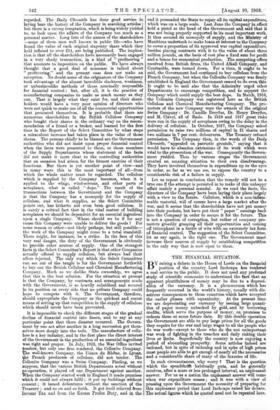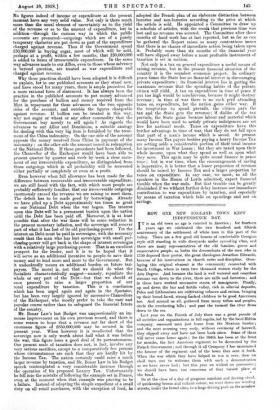THE FINANCIAL SITUATION.
13 Y raising a debate in the House of Lords on the fhianoial position of the country Lord Inchoape has rendered a real service to the public. It does not need any profound study of scientific economics to understand the fact that an apparent plentifulness of money may be clue to a depreci- ation of the ourrenoy. It is a phenomenon which has frequently occurred in the world's history, usually with dis- astrous consequences to those countries which have accepted the earlier phases with equanimity. At the resent time we are depreciating our currency by issuing large quanti- ties of paper money unbacked by gold, and by borrowing credits, which serve the purpose of money, on promises to redeem them at some future date. By this double operation the Government are able to pay large prices for all the goods they require for the war and large wages to all the people who do war work—except to those who do the not unimportant war work of fighting in the trenches and daily risking their lives or Limbs. Superficially the country is now enjoying a period of abounding prosperity. Some articles indeed are rationed, but in spite of rationing and in spite of high prices most people are able to get enough of nearly all the necessaries and a considerable share of many of the-luxuries of life.
In such circumstances, why worry? That is the question which the spendthrift habitually puts, and he generally receives, after a more or less prolonged interval, an unkleasant answer. For us as a nation the unpleasant answer will come when war expenditure ceases; and it was with a view of pressing upon the Government the necessity of preparing for this unpleasant period that Lord Inchcape raised his debate. The actual _figures which he quoted need not be repeated here. No figures indeed of income or expenditure- at the present moment have any very solid value. Not only is there much more than the usual element of uncertainty as to the yield of the revenue or as to the amount of expenditure, but in addition—throngh the curious way in which the public accounts are presented—outgoings which are of a purely temporary character are put down as part a the expenditure charged against revenue. Thus if the Government spend £30,000,000 in buying sugar, most of which will be sold, perhaps at a profit, within a few months, that £30,000,000 is added to items of irrecoverable expenditure. In the same way advances made to our Allies, even to those whose solvency is beyond question, are treated as war expenditure and charged against revenue.
Why these practices should have been adopted it is difficult to explain, for in our published accounts as they stand now, and have stood for many years, there is ample precedent for a more rational form of statement. It has always been the practice in the published accounts to put money advanced for the purchase of bullion and money received from the Mint in repayment for these advances on the two- opposite sides of the account, and outside the figures chargeable against revenue. If bullion can be treated in this way, why not sugar or wheat or any other commodity that the Government buy merely to sell again I As regards the advances to our Allies and Dominions, a suitable analogy for dealing with this very big item is furnished by the treat- ment of the China indemnity. On the one side of the account appears the money received from China in payment of the indemnity ; on the other side the amount issued in redemption of the National Debt. If these precedents had been followed, the Chancellor of- the Exchequer would have been able to present quarter by quarter and week by week a clear state- ment of our irrecoverable expenditure, as distinguished from those outgoings which in all probability will be recovered either partially or completely or even at a profit.
E'en however when full allowance has been made- for the difference between recoverable and irrecoverable expenditure, we are still faced with the fact, with which most people are probably sufficiently familiar, that our irrecoverable outgoings enormously exceed the revenue we are raising to meet them. The deficit has to be made good by borrowings. Already we have piled up a Debt approximately ten times as great as our- National Debt when the war began. The interest upon this Debt will be a permanent burden upon the nation until the Debt has been paid off. Moreover, it is at least possible that after the war there will be some reduction in the present monetary inflation, and the sovereign will recover part of what it has lost of its old purchasing-power. Yet the interest on Debt must be paid in sovereigns, with the necessary result that the man who has lent sovereigns with small pur- chaeing-power will get bach in the shape of interest sovereigns with a relatively large purohasing7power. That is all excellent prospect for the lender, and it is to be hoped that it will serve as an additional incentive to people- to save their money and to lend more and more to the Government. But it undoubtedly means an additional burden on future tax- payers. The moral is, not that we should do what the Socialists characteristically suggest—namely, repudiate the whole or any part of the Debt—but that we should at once proceed to raise a larger proportion of our total expenditure by taxation. This is a conclusion which has been urged again and again in the Spectator, but has been very largely ignored by successive Chancellors of the Exchequer, who mostly prefer to take the easy and popular course rather than to safeguard the financial future of the country. Mr. Bona! Law's last Budget was unquestionably an im- mense improvement on his own previous record, and there is some reason to hope that a revenue not far short of the enormous figure of £850,000,000 may be secured in the present year. When however it is recollected that the sovereign now is only worth about half what it was before the war, this figure loses a good deal of its portentousness. Our present scale of taxation does not, in fact, involve any very serious sacrifices, except to a comparatively few persons whose circumstances are such that they are hardly hit by the Income Tax. The nation certainly could raise a much larger revenue by taxation, and Mr. Bonar Law in his Budget speech contemplated a very considerable increase through the operation of his proposed Luxury Tax. Unfortunately he fell into the mistake of following the example set in France, even at the mament when that example was proving to be a failure. Instead of adopting the simple expedient of a small duty on all retail purchases, with the exception of food, he adopted the French plan of an elaborate distinction between luxuries and non-luxuries according to the price at which the article is sold. He appointed a Committee to draw up a. schedule of articles, with the result that precious time was lost and no revenue was secured. The Committee after three months of hard work has at last reported, bat as far as can be gathered the Report raises so many contentious issues that there is no chance of immediate action being- taken upon it. Probably more than six months of the financial year will have slipped away before a most profitable instrument of taxation is set in motion.
Not only is a tax on general expenditure a useful means of raising revenue, but in the present financial situation of the country it is the soundest economic project. In ordinary peace times the State has no financial interest in discouraging private expenditure ; its financial interest lies in getting the maximum revenue that the spending habits of the private citizen will yield. A tax on expenditure in time of peace if put too high would be mischievous, because it might destroy revenue ; in time of war there is no • such peril attending taxes on expenditure, for the nation gains either way. If the temptation to spend prevails, the citizen pays the tax and the State gets the revenue; if dislike of the tax prevails, the State gains because labour and material which would have been used to satisfy private indulgences are set free for national needs. Taxes on expenditure have this further advantage in time of war, that they do not fall upon that part of a man's income which is saved. At present many Income Tax payers besides paying a heavy Income Tax are setting aside a considerable portion of their total income for investment in War Loans ; but they are taxed upon their whole income, upon what they spend as well as upon what they save. This again may be quite sound finance in peace time ; but in war time, when the encouragement of saving is imperative, it is better that a lesser proportion of revenue should be raised by Income Tax and a larger proportion by taxes .on expenditure. In any case, we must, as all the speakers in the House of- Lords admitted, expect financial trouble when the war ends. But that trouble can be greatly diminished if we without further delay increase our immediate contribution to war expenditure by taxation, and especially by means of taxation which falls on spendings and- not on savings.



































 Previous page
Previous page